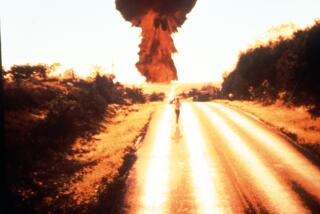‘Sweet Hereafter’ Soars With Silence
The exquisite and overwhelming emotional tapestry that is “The Sweet Hereafter” plays its credits over the simplest and most primal of scenes. An infant and its parents, unclothed and drowsy under white sheets, share the same quiet bed. It’s a pristine moment, an idyllic fantasy of togetherness that almost seems to mock us as a much darker vision of the scenarios that can devastate families gradually unfolds.
While it’s usual to call films haunting, “The Sweet Hereafter” is more accurately described as haunted, both by children who’ve died and those who are alive yet distant and estranged. Directed by Atom Egoyan from Russell Banks’ celebrated novel of a small town’s response to a cataclysmic school bus accident, “The Sweet Hereafter” is a delicate and assured exploration of what different kinds of tragedies do to the parents and children who experience them.
Though his six previous features (including “Exotica” and “The Adjustor”) have made him one of Canada’s most respected writer-directors, matching Egoyan’s highly personal sensibility with this lucid, unadorned book was not an obvious choice. But speaking at Cannes, where “Hereafter” won three major awards, Egoyan said that after years of telling nothing but his own interior stories, he was eager for the challenge of a straightforward adaptation.
Fortunately, Egoyan is incapable of being completely straightforward. Instead “Hereafter” joins the list of exceptional films, ranging from Jean-Luc Godard’s “Contempt” to David Lynch’s “The Elephant Man,” that result when directors with strong personal visions take on conventional material and make it very much their own.
Starting with an unnerving opening shot taken from the point of view of a man trapped inside a car wash, Egoyan and cinematographer Paul Sarossy know how to keep audiences consistently off-balance. Using unexpected juxtapositions and unsettling angles, “Hereafter” has the subtle ability to never provide quite what we’re expecting.
While Banks’ novel fragments his story by telling it through four characters, Egoyan’s screenplay opts for one point of view and instead breaks up its narrative through the use of multiple time frames. “The Sweet Hereafter” moves intricately back and forth between the accident itself, the time before it and the time afterward, and it’s only gradually that we’re able to fit the pieces together and understand what happened when.
The character at the center of “The Sweet Hereafter” is Mitchell Stephens (Ian Holm), a successful negligence attorney who comes to Sam Dent, British Columbia, (moved from the novel’s New York state) intent on filing a class-action suit on behalf of the 14 children who died when the town’s school bus left the highway and plunged into a frozen lake.
It is a younger version of Stephens, probably, that we see in bed under the opening credits, and before we observe him in action in British Columbia we are shown his current relationship with that child, his daughter Zoe (played by the novelist’s daughter Caerthan Banks).
Angry, suspicious, quite possibly still addicted to drugs despite being in and out of numerous clinics, Zoe is a cause of tremendous rage and frustration for a father who now relates to her only as a shrill voice on his mobile phone. So the controlled outrage Stephens brings to his work in Sam Dent is fueled as much as anything by his own terrible anger at having a child irretrievably lost without the solace of having anyone to blame, anyone to sue.
As he moves through the desolate grandeur of Sam Dent in winter, Stephens, played with fluid precision by the masterful Holm, is almost preternatural in his effectiveness. He knows what to say to the grieving parents, knows the time to tell them, “I will represent you only in your anger, not your grief,” the time to insist “there is no such thing as an accident, the word means nothing to me.” When he pleads, “Let me direct your rage,” it is of course a well-thumbed line, but that doesn’t change the fact that he’s sincere in his desire, and his need, to do just that.
The people of Sam Dent whom Stephens talks to are glimpsed on both sides of the accident, trying to peer through the numbness of their grief to decide if a lawsuit would help anesthetize the pain. We meet the college-educated Ottos (Arsinee Khanjian and Earl Pasko), the morose Walkers (Maury Chaykin and Alberta Watson) who run the Bide-a-Wile motel, and the three key townspeople who were co-narrators with Stephens in the novel.
Dolores Driscoll (Garbrielle Rose) is the chatty school bus driver, walrus-mustached Billy Ansell (Bruce Greenwood) is a single parent who lost both his children, and, most poignantly, there is 14-year-old Nicole Burnell (Sarah Polley), once the light of the town, now paralyzed and forced to restart her life as a self-described “wheelchair girl.”
Though this is Egoyan’s first adaptation, “The Sweet Hereafter” could serve as a model for how to do it right. He is in sync with the essence of the novel, the overwhelming nature of the tragedy as well as the unmistakable glimmers of healing and reconciliation, while adding vital elements of his own. It was Egoyan’s idea, for instance, to have Nicole read the Robert Browning/Kate Greenaway version of “The Pied Piper of Hamlin” to Billy Ansell’s children in the days before the accident, a touch that adds a beautiful layer of emphasis to the narrative.
Aside from Holm, many of the actors in “The Sweet Hereafter” are Egoyan regulars, and he directs them expertly, getting an especially subtle performance out of young Polley, well-known in Canada for her television work, whose role becomes more and more central as the story progresses.
What Egoyan has done best is suffuse this story with a sobering, almost stately restraint. Unafraid of necessary silences, willing to let scenes play out, Egoyan understands how potent a deliberate pace can be, how effective it is in making already powerful material strong enough to tear at your heart.
* MPAA rating: R, for sexuality and some language. Times guidelines: strong adult material, including a subplot involving incest.
‘The Sweet Hereafter’
Ian Holm: Mitchell Stephens
Sarah Polley: Nicole Burnell
Bruce Greenwood: Billy Ansell
Tom McCamus: Sam Burnell
Gabrielle Rose: Dolores Driscoll
Arsinee Khanjian: Wanda Otto
Alberta Watson: Risa Walker
Maury Chaykin: Wendell Walker
Released by Fine Line Features. Director Atom Egoyan. Producer Camelia Frieberg. Executive producers Robert Lantos, Andras Hamori. Screenplay Atom Egoyan, based on the novel by Russell Banks. Cinematographer Paul Sarossy. Editor Susan Shipton. Costumes Beth Pasternak. Music Mychael Danna. Production design Philip Barker. Running time: 1 hour, 50 minutes.
*
* Exclusively at Samuel Goldwyn Pavilion Cinemas, Westside Pavilion, 10800 W. Pico Blvd., Los Angeles, (310) 475-0202; Sunset 5, 8000 Sunset Blvd., West Hollywood, (213) 848-3500; Edwards Town Center, 3199 Park Center Drive, Costa Mesa, (714) 751-4184.
More to Read
Only good movies
Get the Indie Focus newsletter, Mark Olsen's weekly guide to the world of cinema.
You may occasionally receive promotional content from the Los Angeles Times.









